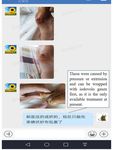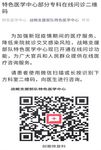Managing chronic wounds during novel coronavirus pneumonia outbreak
←
→
Page content transcription
If your browser does not render page correctly, please read the page content below
Burns & Trauma, 2020, 8, tkaa016
doi: 10.1093/burnst/tkaa016
Letter to the Editor
Letter to the Editor
Managing chronic wounds during novel coronavirus pneumonia outbreak
Downloaded from https://academic.oup.com/burnstrauma/article-abstract/doi/10.1093/burnst/tkaa016/5817040 by guest on 13 April 2020
Rui Wang1 ,# , Yanzhen Peng2 ,# , Yufeng Jiang1 , * and Jianwen Gu3 , *
1
Wound Healing Department, PLA Strategic Support Force Characteristic Medical Center, Beijing 100101, China
2
Center of Minimally Invasive Gynecological Surgery of Beijing Obstetrics and Gynecology Hospital Affiliated to
Capital Medical University, Beijing 10006, China 3 Prevention and Control Group of COVID-19, PLA Strategic Support
Force Characteristic Medical Center, Beijing 100101, China
*Corresponding author. Yufeng Jiang, Email: 787005687@qq.com; Jianwen Gu, Email: gujianwen5000@sina.com
#
Rui Wang and Yanzhen Peng contributed equally to this work.
To the Editor appears to be a particular dilemma for patients with chronic
wounds.
In December of 2019, a widespread outbreak of novel coro-
According to the guidelines and consensus on epidemic
navirus pneumonia (NCP) occurred in Wuhan, China. On
prevention and control recently issued by the National Health
January 12, 2020, the virus causing NCP was named as
Commission and relevant agencies [4–7], and telemedicine
“2019-nCoV” by the World Health Organization [1,2]. The
being able to reduce travel time for patients and medical staff
World Health Organization renamed NCP as “COVID-19”.
[8], we have established a management strategy for patients
COVID-19 is a highly contagious respiratory virus that poses
with chronic wounds outside of the hospital. We have some
a serious threat to human health worldwide. At present,
experiences and advice as following:
COVID-19 has been classified as a Class B infectious disease
in China, and management of Class A infectious diseases 1. To minimize the exposure risk of patients during the epi-
has been adopted. As of March 10, 2020, 80 932 cases were demic, we take advantage of a comprehensive online com-
diagnosed and confirmed as COVID-19 in China, with 60 002 munication strategy and encourage patients to consult
cured cases and 3140 death. Meanwhile, 34 656 cases were their doctors about wound-condition by WeChat, which
diagnosed and confirmed as COVID-19 abroad, in which was used officially in our hospital (Figs.1, 2). WeChat is
4188 cases were cured and 968 cases died. Therefore, the a messaging and calling application that allows people to
prevention and control of pandemic COVID-19 enters a easily connect with others. It’s the all-in-one communi-
critical period. cations app for text (SMS/MMS), voice and video calls,
The sudden outbreak of COVID-19 makes the manage- and files. It also supports communication for group talk.
ment of chronic wounds more difficult. Among the chronic It can be used in most smartphones and consumes a small
wound patients recorded from January 2018 to January amount of net resource. It is frequentlly used in China,
2019, the number of patients over 50 years old accounted for as FaceBook, Skype and LINE Apps used by American,
76.74%, of which 78.25% were complicated with underlying South Korean and Japanese. Through the wound pictures
diseases [3]. Among the underlying diseases of chronic wound uploaded by the patient, or communication with medical
patients, the top four diseases were diabetes, cardiovascular staffs, the doctor can give the preliminary advice.
and cerebrovascular diseases, hypertension and respiratory 2. We have arranged for doctors to manage the wounds of
diseases. The basic diseases and older age are the susceptibility the patients, who were treated in our department and left
factors of the COVID-19, as announced by the National hospital before their wounds healed completely because
Health Commission. Therefore, the conflict between the need of prevention and control of COVID-19. We tried to
for managing wound and the risk of suffering communicable avoid secondary damage such as amputation because of
disease during the prevention and control of COVID-19 lacking active treatment of the diabetic foot in this way.
© The Author(s) 2020. Published by Oxford University Press. All rights reserved.
This is an Open Access article distributed under the terms of the Creative Commons Attribution Non-Commercial License (http://creativecommons.org/licenses/by-
1
nc/4.0/), which permits non-commercial re-use, distribution, and reproduction in any medium, provided the original work is properly cited. For commercial re-use,
please contact journals.permissions@oup.com2 Burns & Trauma, 2020, Vol. 8, tkaa016
Downloaded from https://academic.oup.com/burnstrauma/article-abstract/doi/10.1093/burnst/tkaa016/5817040 by guest on 13 April 2020
Figure 1. WeChat online consultation was established officially in PLA Strate-
gic Support Force Characteristic Medical Center. Quick response (QR) code Figure 3. Foam dressing covering wound
was created for online consultation of some specialties. Translation of the
figure: In order to provide the medical services during the novel coronavirus
epidemic and reduce the risk of cross infection, the online service is able to
provide instant medical consultation for patients. Please scan the QR code
and identify the department to consult the respective doctors
Figure 4. Instructing homebound patient in facilitating negative pressure
wound therapy on WeChat
3. We have taken advantage of modern dressing such as
foam dressings and negative pressure wound therapy
(Figs. 3,4), for dressing change so as to prolong the inter-
vals and decrease frequencies of wound dressing change.
4. We also instruct these patients to master some basic
wound managing skills in a short period, so that they
can change their own dressing for some uncomplicated
wound at home.
5. If the patient needs some treatments such as debride-
Figure 2. Screenshot of WeChat conversation between patients and doc-
ment, operation, or revascularization because of infec-
tors. Instructing homebound patient in basic skill of managing wounds on tion, necrosis and/or gangrene, our team member will
WeChat online consult some specialists in different fields accord-Burns & Trauma, 2020, Vol. 8, tkaa016 3
6. Up to March 6, 2020, we managed 15 patients’ wounds in
one month. None of their wound bed were getting worse
and out of control. Six patients’ wounds have been healed
(Fig. 5). Other 9 patients’ are getting improved as well.
In summary, it is an ideal way to manage chronic wound
by modern dressing, facilitating technology such as nega-
tive pressure wound therapy and tele-medicine to maintain
effective therapy as the flow chart (Fig. 6), and meanwhile
Downloaded from https://academic.oup.com/burnstrauma/article-abstract/doi/10.1093/burnst/tkaa016/5817040 by guest on 13 April 2020
to avoid the exposure risk of COVID-19 during the critical
COVID-19 pandemic prevention and control period. This
managing strategy would also be applied in treating patients
in earthquake, plague, and other inconvenient situation.
Acknowledgements
None.
Conflicts of interest
The authors declare no competing interests.
Prior Presentation
The authors declare that this paper has not been published previously.
References
1. Li N, Liu T, Chen H, Liao J. Management strategy of burn and
wound repair ward in new coronavirus outbreak. [J/OL]. Chin J
Figure 5. Screenshot of WeChat conversation between patients and doctors.
Wound nearly healed by remote management Burns. 2020; 36: Epub ahead of print.
2. Ma S, Yuan Z, Peng Y, Luo Q, Song H, Xiang F et al. Rec-
ommendations for the regulation of medical practices of burn
treatment during the outbreak of the coronavirus disease 2019.
ing to the patient’s condition. As such, the patient will get
Chin J Burns. 2020; 36: Epub ahead of print.
the appropriate advice online, instead of visiting the doc- 3. Dong W, Nie L, Wu M, Xie T, Liu Y, Tang J et al. Wound care log
tors. If the patient does need hospitalization, the nearest APP-A new application to record wound diagnosis and healing.
professional wound-healing clinic is the best choice, and Chin J Traumatol. 2019; 22: 296–9.
fever and novel coronavirus pneumonia screen should be 4. General Office of National Health Commission. Guide to
performed in fever clinic before admission. novel coronavirus infection prevention and control in medical
Figure 6. Flow chart of managing chronic wounds during novel coronavirus pneumonia outbreak4 Burns & Trauma, 2020, Vol. 8, tkaa016
institutions (first edition). (2020-01-22) [2020-02-10]. http:// 7. General Office of National Health Commission. Guidelines on
www.gov.cn/zhengce/zhengceku/2020-01/23/content_5471857. the use of common medical protective equipment in pneumonia
htm. prevention and control of novel coronavirus infection (trial).
5. General Office of National Health Commission. Novel coro- (2020-01-26) [2020-02-10]. http://www.nhc.gov.cn/yzygj/s7659/
navirus pneumonia prevention and control program (fourth 202001/e71c5de925a64eafbe1ce790debab5c6.shtml.
edition). (2020-02-06) [2020-02-10]. http://www.gov.cn/zhengce/ 8. Xie T, Wu M, Liu H, Niu Y, Chen H, Zheng T et al.
zhengceku/2020-02/07/content_5475813.htm. Application of telemedicine system with 4g and high-
6. General Office of National Health Commission. Diagnosis and resolution video in diagnosis and treatment of wounds
treatment of pneumonia caused by novel coronavirus (trial ver- between wound healing department and community health
Downloaded from https://academic.oup.com/burnstrauma/article-abstract/doi/10.1093/burnst/tkaa016/5817040 by guest on 13 April 2020
sion 5). (2020-02-04) [2020-02-10]. https://baijiahao.baidu.com/ care center in China. Int J Low Extrem Wounds. 2011; 10:
s?id=1657671466518573463&wfr=spider&for=pc. 167–8.You can also read























































